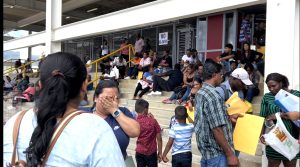By Sue-Ann Wayow
SOME $1.9 billion have been noted by the Financial Intelligence Unit (FIUTT) insuspicious transactions and activity reports over the last financial year.
This was revealed by Finance Minister Colm Imbert on Monday as he disclosed contents of the FIUTT report in Parliament.
Imbert said the FIUTT under the FIUTT Act had continued using the intelligence provided from the analysis of Suspicious Transaction Reports/Suspicious Activity Reports (STRs/SARs) to ensure entities’ compliance with the Anti-Money Laundering/Counter Financing of Terrorism/Counter Proliferation Financing (AML/CFT/CPF) legal obligations.
During the period that ended in September 2022, Imbert said the FIUTT received 958 STRs/SARs, which was a decrease of 42% compared with the same period, the year before.
The total monetary value of the 958 STRs/SARs received was $1,937,211,057.
The banking sector submitted 76 % of the STRs/SARs, followed by the Money of Value Transfer Services (MVTS) sector and Co-operative Societies, accounting for 11 per cent and five per cent, respectively.
Imbert said, “During the reporting period, submissions from the co-operative societies, investment companies, mortgage companies, MVTS, motor vehicle sales, real estate and private members’ clubs sectors all decreased due to the pandemic restrictions.”
He said overall, a 44 % decrease was noted in STRs/SARs submissions by financial institutions and a 21 per cent decrease in submissions from listed business (LBs).
Notable, was an 83 per cent increase in submissions from jewellers, the only LB to record a significant increase in STRs/SARs submissions in the reporting period, Imbert stated.
Of the 958 STRS/SARS, Imbert said 844 involving $1,586,346,802 were completed transactions, while some 195 involving $350,864,255 were attempted transactions with 16 being both completed and attempted transactions.
Suspicious activity ranked the highest among the five most common reasons for the submission of STRs/SARs to the FIUTT, representing 301 persons.
Of the other suspicious transactions listed by the FIUTT, 211 persons were involved in tax evasion, 196- fraud, 155-money laundering and 35-drug trafficking accounting for 94% of the total STRs/SARs received and 60% of the total monetary value of all STRs/SARs submitted.
More compliance needed from credit union sector
Imbert said while financial institutions were generally compliant with the obligation for quarterly property terrorist reports (QPTR), based on a compliance analysis of QPTR submissions, there was need for improved compliance by the credit union sector.
Entities were compliant upon receipt of warning letters, attributed to the measures implemented by the FIUTT in the conduct of monitoring and surveillance of Supervised Entities for compliance with their obligation.
Some 88 per cent of non-regulated financial institutions under the FIUTT including credit unions, building societies and MVTS were tested for compliance on AML/CFT/CPF.

Foreign transactions
Imbert said the FIUTT received 16 requests from foreign authorities during the reporting period, representing a 45% increase when compared to the previous reporting period.
Requests received from foreign authorities originated mainly from the Caribbean, the Middle East and Europe.
These requests featured a total of 85 subjects in contrast to the 26 recorded in the previous year.
“The suspected criminal conduct in the majority of cases was financing of terrorism related, with four of the requests seeking intelligence on 34 subjects,” he said.
The FIUTT also made 23 requests comprising of 45 subjects to foreign authorities for financial intelligence and information.
Imbert said the requests made to foreign authorities involved 11 cases of suspected Fraud and five cases of Drug Trafficking.
The FIUTT sent the majority of requests to foreign authorities in the Caribbean, the Americas and Asia.
During the reporting period, the FIUTT also disseminated 12 Spontaneous Disclosures to foreign FIUs and LEAs 100% more when compared to the previous year.
More legislation coming
Imbert announced, “Further legislative amendments will be introduced in areas such as the extension of the range of sanctions to include administrative fines in the AML/CFT/CPF regime; the introduction of AML/CFT/CPF Regulations formulated specifically for non-profit organisations; further amendments to the FIUTTA.”
“Legislative developments to include the regulation, supervision and monitoring of Virtual Assets and Virtual Assets Service Providers for both AML/CFT/CPF and prudential measures; and the introduction of a Currency Threshold Reporting regime for Reporting Entities.”
Measures undertaken
Additionally, 457 new entities were registered with the FIUTT, bringing the total number of registrants to 4,193 as at September 30, 2022. As at September 30, 2022, 4,503 entities were operating under the FIUTT’s AML/CFT/CPF supervision.
There were also 30 entities de-registering from the FIUTT.
Of this number, the Real Estate and Attorney-at-Law sectors continue to lead the way with the highest number of new registrants, Imbert said.
During the reporting period, the FIUTT in its drive towards digitalisation, apart from allowing the electronic submission of registration documents, the FIUTT also implemented a secure electronic dispatch system for the issuance of Registration Certificates to Supervised Entities.
It also introduced an appointment scheduling system for the collection of registration certificates, upon the entity’s request.
Imbert also stated that within the reporting period, Trinidad and Tobago saw the first Electronic Money Issuer (EMI) to be licenced by the Central Bank to operate and perform EMI activities.
Consequently, the FIUTT’s AML/CFT/CPF supervisory mandate for EMIs was enacted.
The FIUTT also signed a Memorandum of Understanding with the Superintendency of Banks through the Special Verification Intendancy (IVE) of the Republic of Guatemala. The total number of MOUs signed between the FIUTT and foreign FIUs is now 36.
And there are 19 vacant positions to be filled in the FIUTT, 14 of which are within the core areas of the Analysis and Compliance and Outreach Divisions.
![]()













